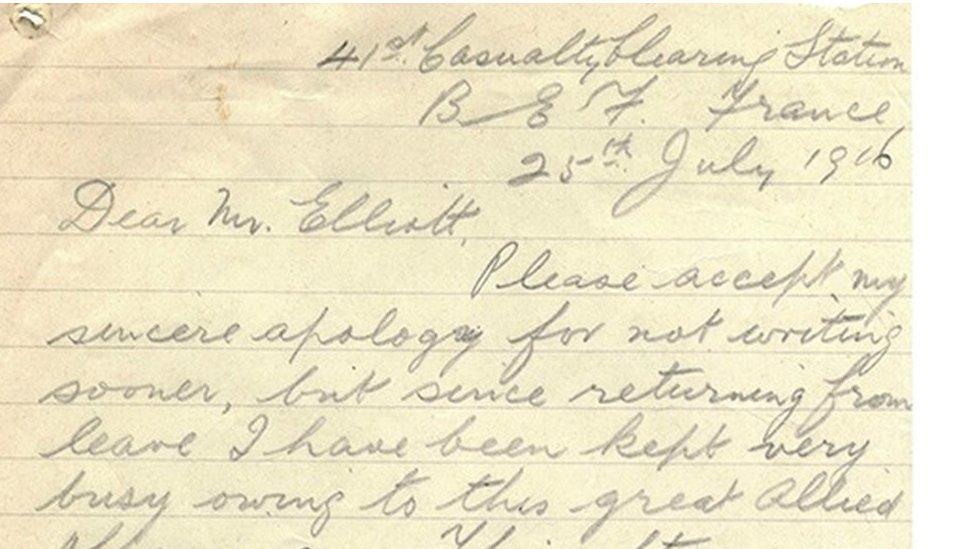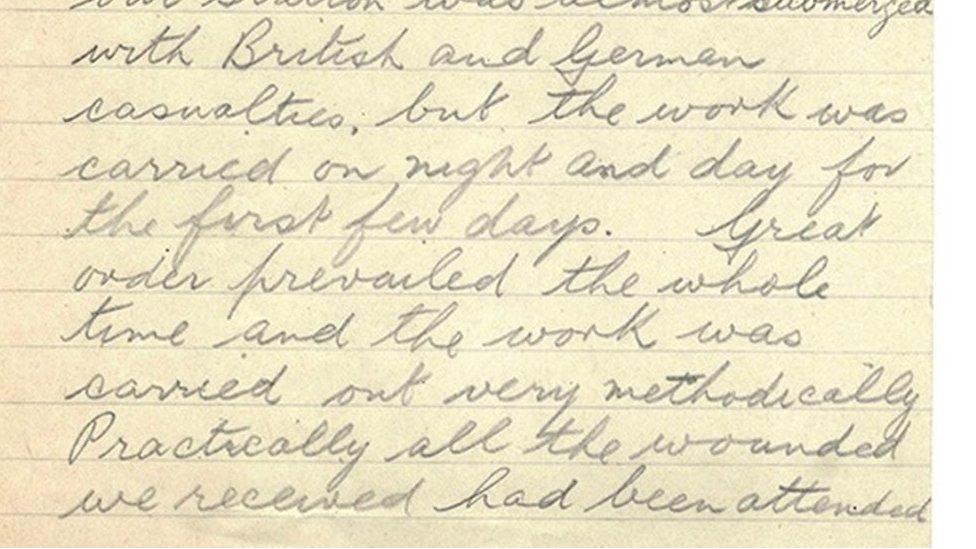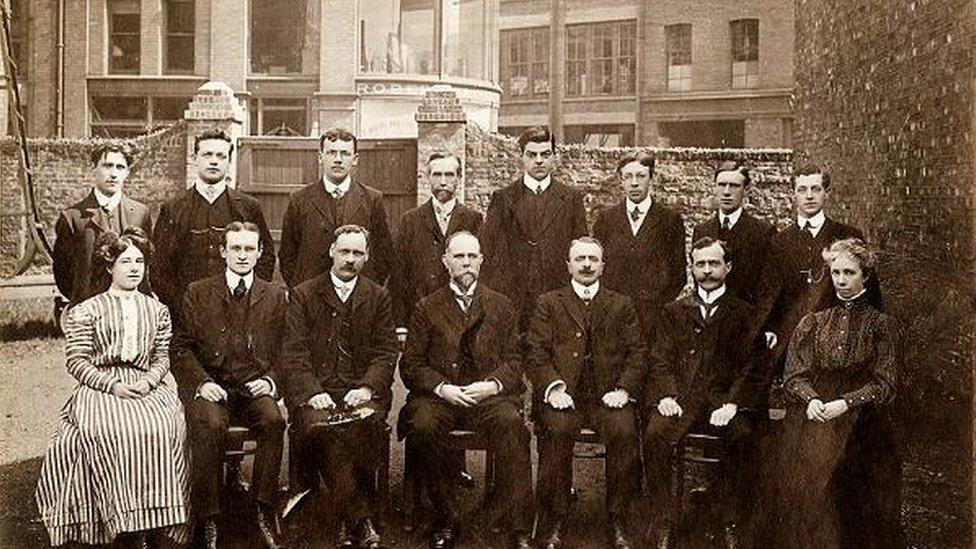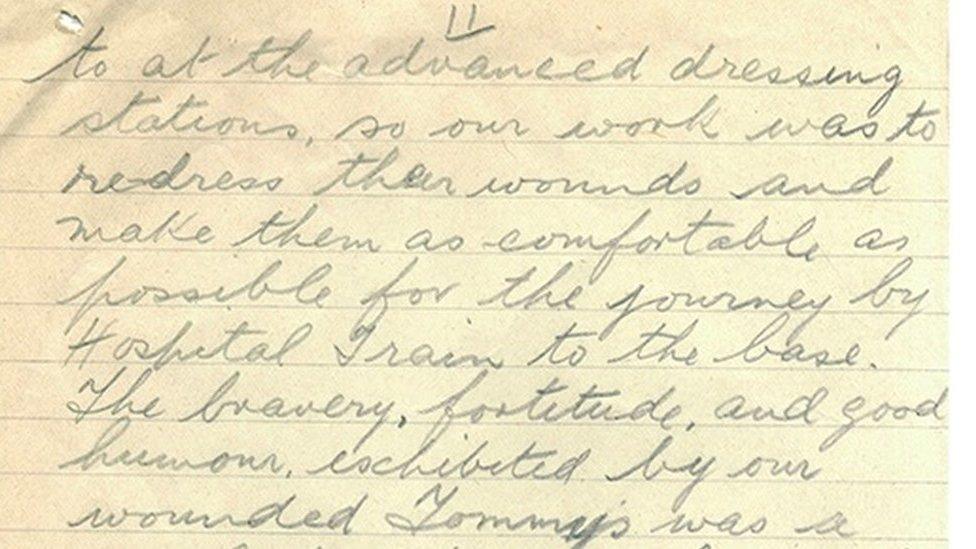World War One: Belfast 'library men' archive gives glimpse into frontline life
- Published

An archive of letters written by Belfast library staff who were enlisted to the Army during World War One has been published online.
The letters were written to the chief librarian to fulfil a condition of their employment during the war.
The correspondence allowed them to continue to receive half of their salaries during their service.
The letters have now been published by Libraries NI, external and offer an insight into their experiences from the front.
During the war, 11 members of staff from Belfast public libraries enlisted in various regiments of the Army.
More than 200 letters were exchanged between these 'library men' and the chief librarian between 1914 and 1919.
They were written in order to receive the half-pay that Belfast Public Libraries continued to give their staff during war service.

Joseph Fitzsimons, known as Joe, was an assistant librarian in Belfast Central Library at the outbreak of war.
He joined the 41st Casualty Clearing Station on 7 June 1915.
Joe left for France at the end of November 1915 as a nursing orderly, turning down a position of corporal to remain working with friends.
On 25 July 1916 he wrote to George Elliott, the chief librarian: "I have had several Ulster Division lads on my ward during the first days of the rush.
"One lad, named Rainey, whose parents live on Royal Avenue opposite Tele offices, lay in an adjoining ward.
"His right arm was missing and several fingers of his left hand also. I had a long conversation with him and he was looking forward to going back to 'old Belfast'.
"The next evening he died very peacefully. His death was due to shock. On the whole, I think it was happy for him as he was very cruelly crippled."

Belfast Public Libraries senior library staff in the yard of Belfast Central Library in 1909
The Robert Rainey Joe was referring to, was a rifleman with the 9th Battalion Royal Irish Rifles (West Belfast Volunteers).
He died on 11 July 1916 aged 22.
Robert was listed on the 1911 census as an "office boy" living at 137a Royal Avenue.
Thomas Coulson rose through the ranks to become a major. He stated in one letter, dated 30 April 1917: "It is very satisfactory to find that it is possible to make progress in the world. I had begun to doubt it while in Belfast."
Born in South Shields, Coulson took up the position of branch librarian in the Falls Road branch library in 1909.
He made several references to undertaking intelligence work throughout his correspondence and resigned his library post in May 1919 to remain in the Army.
In his resignation letter Thomas Coulson said: "I am sending by this same post but under a different cover a letter resigning my position with your staff.
"I have been now definitely retained in the army of occupation and may not be released for some considerable time. I am as a matter of fact anticipating having to go to Turkey on intelligence work."

It is not clear what exactly this involved, but he may have used it as a source of inspiration for two novels.
In 1930 Thomas Coulson wrote 'Mata Hari: Courtesan and Spy', which was turned into a motion picture in 1931 starring Greta Garbo and 'The Queen of Spies: Louise de Bettignies' in 1935.
Irene Knox, chief executive of Libraries NI said: "These letters provide an insight into the lives of these ordinary men who were serving at the front during the First World War.
"The eleven library men came from a range of backgrounds and religious denominations.
"Some prospered after the war, like Major Thomas Coulson. Others were left with extensive injuries making it harder for them to settle back into employment and civilian life.
"We are keen to learn more about these men and to add to the material we hold about them and would ask members of the public to get in touch if they have any photographs or information from stories that have perhaps been handed down through families."
For more information on 'The Library Men', log on to www.librariesni.org.uk/LibrarymenofWW1, external and follow the links.